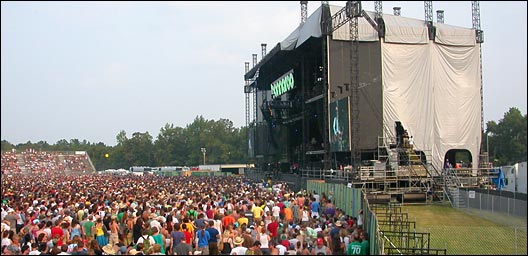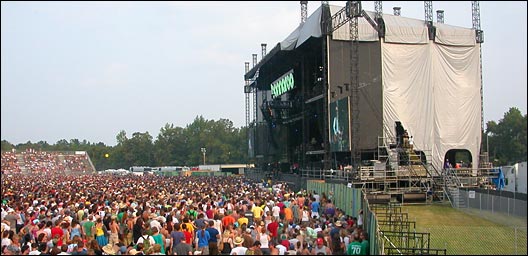
Bonnaroo 2006.
Photo: Sarah van Schagen.
I’m sitting in the middle of a field in rural Tennessee, and it feels like it’s got to be 110 degrees out. Somehow I’ve forgotten about my sweat-lined brow and muddy shoes; instead, I’m focused on listening to Bonnaroo’s head press guy, Ken Weinstein of Big Hassle Media, talk about the music festival’s ongoing efforts to put on a greener event. “No one likes to be trendy,” he says. “But as trends go, this greening shit is pretty cool.”
The “greening shit” he’s referring to is certainly a growing trend among music festivals. From dishing out organic food on compostable dishware to using recycled toilet paper in the port-o-potties to powering stages with solar energy or biodiesel, festivals around the country are getting creative in their efforts to be green. Some, like Bonnaroo and Lollapalooza, are even devoting venue space to the issue, inviting artists and fans to participate in educational activities and visit informational booths staffed by nonprofits (like Grist).

But can a music festival ever truly be green? An hour in a line of idling vehicles waiting to reach Bonnaroo’s entry gates answered that question for one Grist staffer. Certainly any event requiring masses of people to travel is already in the red when it comes to being green. Whether an event is in an urban center or in the center of a field starts to matter big-time when you’re aiming for sustainability.
The sheer volume of trash generated by one of these multi-day events is also a massive issue. Last year’s Bonnaroo festival produced more than 1 million pounds of waste, but recycling, composting, and reuse efforts kept more than half of it from ever reaching a landfill.
As cities across the world this week begin preparing for the climate-change-focused Live Earth concerts on 7/7/07 (an event that has come under fire itself), I decided to take a closer look at what some of the major music festivals in the U.S. are doing (or have done) this year to address climate issues.
I’ve graded them based on overall intent and six specific factors: ubiquity of recycling bins; use of green power sources like solar, biodiesel, and wind; presence of green exhibits or educational aspects; purchase of carbon offsets; direction of donations or proceeds to green causes; and availability of organic and local food options.
Unfortunately (for the music fan in me, but probably fortunately for the planet), I haven’t been able to travel to all of these festivals and judge them firsthand. Instead, I’ve relied on the festival websites, press releases, media coverage, and event organizers themselves when possible — not as good as being there, but it does help indicate how well the festivals are communicating green initiatives to fans.
| click for details | ||||||
| South by Southwest | ||||||
| Coachella | ||||||
| Sasquatch! | ||||||
| Bonnaroo | ||||||
| Lollapalooza | ||||||
| Bumbershoot | ||||||
| Austin City Limits |
South by Southwest
Where: Austin, Texas
When: March 9-18, 2007
Who: 27,000 attendees
The scoop: In addition to offsetting energy use at concert venues during the festival, SXSW organizers accounted for energy used all year at their offices. They also boosted mass-transit options for festivalgoers and assisted in local tree-planting efforts.
The score: B-
 |
 |
 |
 |
 |
![]()
Coachella
Where: Indio, California
When: April 27-29, 2007
Who: 100,000 attendees
The scoop: Apart from a partnership with youth-focused eco-group Global Inheritance that resulted in an alternative-energy display and carpooling incentives, this Hollywood-heavy festival showed little green initiative.
The score: C-
 |
 |
![]()
Sasquatch!
Where: The Gorge, George, Washington
When: May 26-27, 2007
Who: 22,000 attendees
The scoop: Via Sustainable Energy Partner’s Carbon Harmony program, the event was over 100 percent offset, but that’s about as green as it got. Aside from the Global Inheritance TRASHed Recycling Store, there was nary a recycling bin in sight.
The score: D
 |
![]()
Bonnaroo Music & Arts Festival
Where: Manchester, Tennessee
When: June 14-17, 2007
Who: 80,000 attendees
The scoop: The jam-band festival’s ongoing efforts to be greener this year include use of non-VOC paints, organic cotton T-shirts, recycled toilet paper, a festival-wide composting program, and a solar-powered stage.
The score: B+
 |
 |
 |
 |
 |
![]()
Lollapalooza
Where: Grant Park, Chicago
When: Aug. 3-5, 2007
Who: 165,000 attendees
The scoop: Former Jane’s Addiction frontman Perry Farrell has worked hard to green this fest, which this year will use biodiesel to power vendor stands and solar energy to power a small stage. Additionally, a Green Street area will feature nonprofit-staffed booths to educate concertgoers on eco-issues, and ‘Palooza proceeds will benefit Chicago’s Parkways Foundation.
The score: A-
 |
 |
 |
 |
 |
 |
![]()
Bumbershoot
Where: Seattle, Washington
When: Sept. 1-3, 2007
Who: 150,000 attendees
The scoop: This long-established nonprofit music festival is aiming to fully integrate green initiatives into its operations and hopes to get festivalgoers on board by offering rewards (like cash!) for recycling. Because of its urban location (read: limited parking), bikers and carpoolers will also be encouraged with incentives.
The score: B-
 |
 |
 |
 |
![]()
Austin City Limits Music Festival
Where: Zilker Park, Austin, Texas
When: Sept. 14-16, 2007
Who: 165,000 attendees
The scoop: Festival promoters helped jumpstart an Austin Parks & Rec plan to install an irrigation system on the Zilker Park grounds, providing healthier grass for concertgoers and park users year-round. ACL will also feature a special area within festival grounds to highlight various environmental nonprofit groups.
The score: B+
 |
 |
 |
 |
 |
 |



